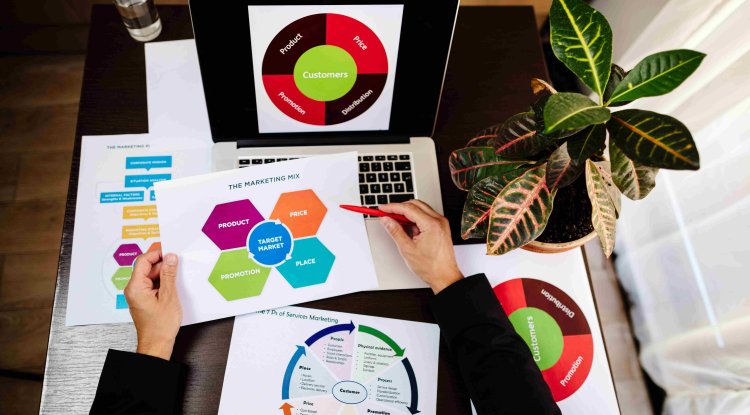Progressive Profiling for B2B vs B2C: Tailoring Your Strategy Based on Industry Needs
Discover how to tailor your progressive profiling strategy for B2B and B2C markets. Learn the key differences and get insights from case studies that drive results.

In the ever-evolving landscape of digital marketing, understanding the nuances between B2B (Business-to-Business) and B2C (Business-to-Consumer) strategies is crucial. One powerful technique that can enhance customer engagement and drive conversions in both sectors is progressive profiling. This article delves into the differences in progressive profiling strategies for B2B and B2C businesses, emphasizing the importance of tailoring your approach based on industry needs.
What is Progressive Profiling?
Progressive profiling is a method used to collect customer information gradually, rather than asking for extensive data upfront. This approach allows marketers to create a comprehensive customer profile over time, improving the relevance of marketing efforts and enhancing user experience.
In B2B environments, the sales cycle is longer, and the decision-making process often involves multiple stakeholders. Here, progressive profiling can help identify the needs and pain points of various decision-makers, allowing businesses to tailor their marketing messages accordingly.
Conversely, B2C interactions are typically more transactional and driven by immediate consumer needs. In this context, progressive profiling can enhance personalization, making it easier to target consumers with tailored offers and communications based on their preferences and behaviors.
Progressive Profiling in B2B
-
Longer Sales Cycles: In B2B, understanding the customer’s business challenges is critical. This requires gathering detailed information about the organization and its stakeholders. Implementing progressive profiling in this context allows marketers to slowly build comprehensive profiles through strategic interactions.
-
Multi-Stakeholder Engagement: B2B purchases often involve multiple stakeholders. Progressive profiling allows marketers to segment their audience based on different roles within the organization, tailoring content to address the specific concerns of decision-makers, influencers, and end-users.
-
Lead Scoring and Qualification: By using progressive profiling, B2B marketers can enhance lead scoring systems. As more data is gathered, businesses can refine their scoring models, identifying high-value leads and prioritizing them for follow-up.
Case Study: B2B Implementation
At a previous organization, we implemented progressive profiling in our lead nurturing campaigns targeting IT decision-makers. Initially, we asked for basic information like name and email address. In subsequent interactions, we gradually requested details such as company size, industry, and specific challenges faced by their organization.
This approach allowed us to personalize our content effectively, aligning our solutions with their needs. As a result, we experienced a 35% increase in engagement rates and a 20% boost in qualified leads over six months.
Progressive Profiling in B2C
-
Immediate Personalization: B2C marketers can use progressive profiling to capture consumer preferences in real-time. This is especially useful in e-commerce, where user experience can make or break a sale.
-
Enhanced Customer Experience: By gradually collecting data on customer preferences, behaviors, and purchase history, B2C companies can create more relevant marketing messages, enhancing the overall customer experience and driving loyalty.
-
Targeted Promotions: Progressive profiling enables B2C marketers to tailor promotions and offers based on the individual’s journey. By understanding what products or services a customer is interested in, businesses can send timely and relevant communications, increasing conversion rates.
Case Study: B2C Implementation
In a recent campaign for an e-commerce brand, we employed progressive profiling to enhance our email marketing strategy. We started by collecting minimal information upon signup and progressively gathered insights on customer preferences through follow-up surveys and engagement tracking.
As we built these profiles, we were able to segment our audience effectively, leading to a 50% increase in email open rates and a 30% increase in conversion rates for personalized offers. The result was a significant uptick in customer satisfaction and repeat purchases.
Key Differences in Strategy
-
Data Collection Approach: B2B marketers focus on detailed, segmented information reflecting the complexity of decision-making processes. In contrast, B2C marketers prioritize quick data capture to enhance immediate consumer experiences.
-
Content Personalization: B2B content often addresses business challenges and solutions, while B2C focuses on emotional triggers and consumer needs.
-
Engagement Metrics: B2B success is measured through lead quality and nurturing effectiveness, whereas B2C emphasizes customer retention and immediate sales.
Conclusion
Mastering progressive profiling requires a deep understanding of your target audience and the unique challenges they face, whether in a B2B or B2C context. By tailoring your strategy based on industry needs, you can create a more effective and engaging marketing approach that drives better results.
Join me on this journey of discovery, and let's unlock the full potential of progressive profiling together.
About Me
I am Raghav Chugh, a seasoned digital marketing and technology professional passionate about leveraging data to drive business success. With three Marketo Certified Expert (MCE) certifications and extensive experience in lead lifecycle design, marketing activities, and database management, I am well-equipped to guide you on your journey to mastering Marketo's Revenue Cycle Analytics.
About SMRTMR.com
At SMRTMR.com (Strategic Marketing Reach Through Marketing Robotics), we are dedicated to providing valuable information and resources to readers across the globe. Our articles, like this one, aim to empower individuals and businesses with the knowledge they need to succeed in the ever-evolving digital landscape.
Raghav Chugh, the founder of SMRTMR.com, brings his expertise in digital marketing and technology to each article. With a commitment to delivering high-quality, actionable content, SMRTMR.com has become a trusted source for professionals seeking to stay ahead in the world of digital marketing.
What's Your Reaction?




















